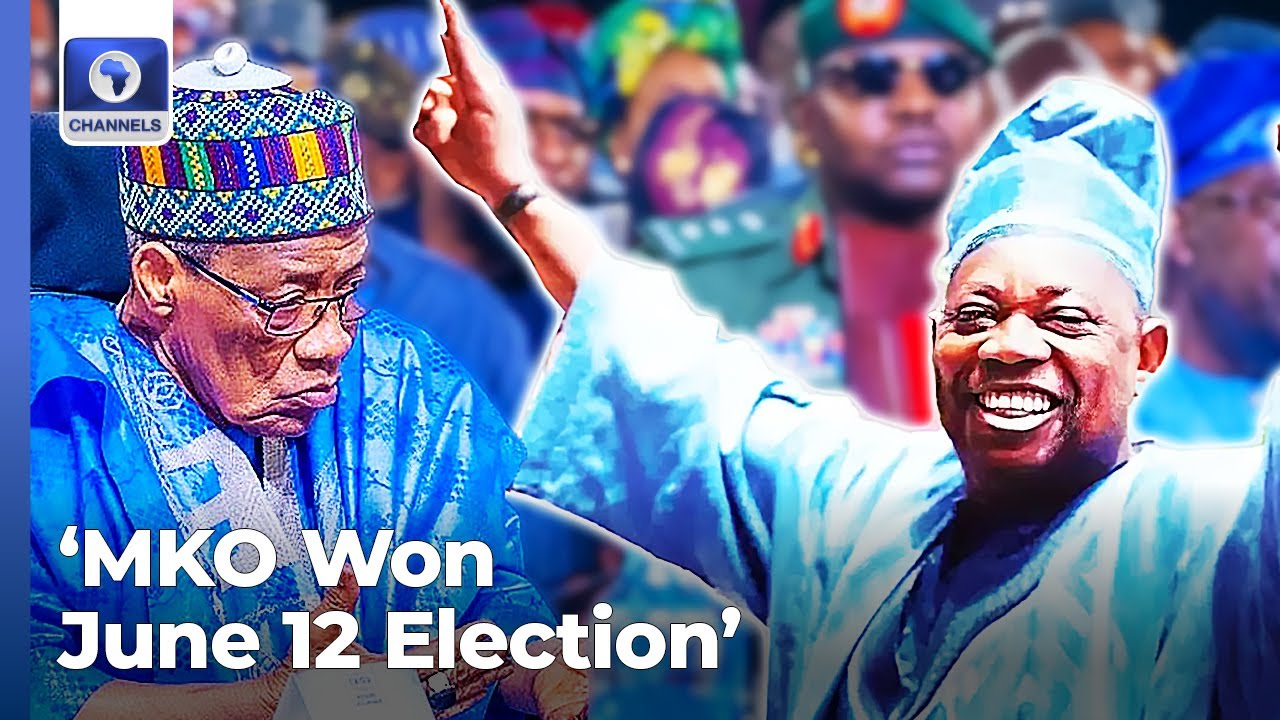After 32 years, IBB has admitted Abiola won the June 12, 1993 election in Nigeria.
Newsone Nigeria reports that former Nigerian Military ruler, Ibrahim Badamasi Babangida, also known as IBB, has publicly expressed regret over the annulment of the June 12, 1993, presidential election.
This online news platform understands that IBB took full responsibility for the cancellation at the launch of his autobiography, “A Journey in Service,” in Abuja, Nigeria’s capital on Thursday, February 20, 2025, acknowledging that mistakes were made during his watch.
The former Head of State admitted that Moshood Kashimawo Olawale Abiola, the candidate of the Social Democratic Party, won the election.
He said: “I regret June 12. I accept full responsibility for the decisions taken and June 12 happened under my watch. Mistakes, missteps happened in quick successions.”
Babangida’s autobiography also sheds light on the events surrounding the annulment.
Reflecting on his controversial decision, Babangida described it as a regrettable chapter orchestrated by a cabal within his administration.
“To suddenly have an announcement made without my authority was, to put it mildly, alarming. I remember saying: ‘These nefarious ‘inside’ forces opposed to the elections have outflanked me!’ I would later find out that the ‘forces’, led by General Abacha, annulled the elections. There and then, I knew I was caught between ‘a devil and the deep blue sea’. From then on, the June 12 elections took on a painful twist for which, as I will show later, I regrettably took responsibility,” he explained.
Speaking during the presentation of his autobiography ‘A Journey in Service,’ the former president said: “Undoubtedly credible, free and fair elections were held on June 12, 1993. However, the tragic irony of history remains that the administration which devised a near-perfect electoral system and conducted those near-perfect elections could not complete the process.
“That accident of history is most regrettable. The nation is entitled to expect my expression of regret. As a leader of the military administration, I accept full responsibility for all decisions taken under my watch.”
He added: “And June 12 happened under my watch; mistakes, oversights and missteps occurred in quick succession. But as I say in my book, in all matters, we acted in the supreme national interest so that Nigeria could survive.
“Our nation’s march to democracy was interrupted; a fact I deeply regret. But Nigeria and democracy are still alive, a testament to commitment.”
The journey to the annulment of the June 12 election, however, began two days before the election when a judge granted an injunction stopping the electoral commission from proceeding with the polls. A group known as the Association for a Better Nigeria (ABN), led by Arthur Nzeribe, had filed the lawsuit.
Babangida admitted in his autobiography that Nzeribe was close to him but denied supporting the activities of ABN.
“From out of nowhere, on June 10, two days before the presidential election, the same shadowy group, ABN, which had been campaigning for an extension of military rule, approached the Abuja High Court of Justice Bassey Ikpeme for an injunction to stop NEC (National Electoral Commission) from conducting the elections.”
“Unknown to me at the time, Justice Ikpeme, who was relatively young at the Bench, had worked in the chambers of the Attorney-General and Minister of Justice, Clement Akpamgbo. Strangely, Justice Ikpeme, in the dead of night, in clear violation of Decree 13, which barred any court from interfering with NEC’s conduct or scheduling of the elections, granted the ABN an injunction stopping NEC from conducting the June 12 elections. There was confusion everywhere.”
Babangida said he quickly convened an emergency meeting of the National Defence and Security Council (NDSC), the country’s highest governing body, to discuss the way forward.
He said, “On Friday, June 11, as the NDSC meeting was going on, I learned that a Lagos High Court had ruled that NEC should go ahead with the elections. The NDSC meeting on Friday, June 11, only hours before the scheduled elections, was one of the stormiest meetings I ever conducted as President. Strangely, the Attorney-General and Justice Minister, Akpamgbo, who was the nation’s chief law officer and who ought to know that the Justice Ikpeme court order violated an extant law (and was tacitly supported, it turned out, by some of my topmost military officers), advised that the elections be postponed in compliance with the Abuja court order.
“Professor Nwosu insisted, to the dismay of my top military colleagues, that he had enough powers under the law to proceed with the elections. The arguments went on for hours in a tense atmosphere, populated by some who wanted the elections postponed, among them the Chief of Defence Staff, General Sani Abacha, Lt-General Joshua Dogonyaro, and a few Service Chiefs. But I had my views bottled inside me! Even before Professor Nwosu presented his compelling argument, I decided that the elections should proceed, backed firmly by the Chief of Army Staff, Lt-General Salihu Ibrahim.”
Babangida said he looked across the room and said to Nwosu: “Go ahead with the elections. Go to your office, hold a world press conference, and tell everyone the elections will be held tomorrow as planned.”
He added that on June 16, Nwosu suddenly stopped the announcement of the election results, even though the voting had been peaceful and orderly.
“And then, on June 16, without my knowledge or prior approval, NEC Chairman, Professor Nwosu, announced the suspension of the June 12 election results ‘until further notice’. I knew instantly that certain fifth columnists were at work and that there was a need for extra care! Even after that suspension of the announcements of results, ABN obtained another ‘strange’ court order from Justice Saleh’s court in Abuja, stopping the release of the results of the elections,” he wrote.
Watch the moment IBB admitted Abiola won the June 12 election below…
“There was no doubt in my mind, MKO Abiola won the election. He satisfied all the requirements” — IBB finally admits that MKO won the June 12 poll.
— YabaLeftOnline (@yabaleftonline) February 20, 2025
June 12 election
Meanwhile, Newsone reports that the June 12 election in 1993 was a pivotal moment in Nigerian history, marking a rare instance of Nigerians uniting across ethnic and regional lines to elect a president. Abiola’s victory was widely recognized, but the election was annulled by Babangida’s regime, sparking widespread protests and unrest.
Babangida’s regret over the annulment is a significant acknowledgment of the harm caused by his actions. However, it also raises questions about the motivations behind his decision to annul the election and the legacy of his rule.








